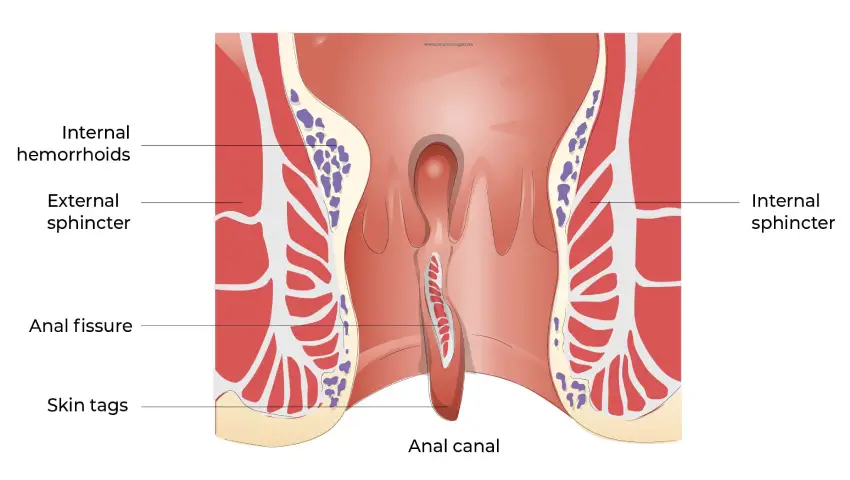
Anal fissures are small cuts or cracks in the skin around the anus. They are very painful and can cause bleeding while passing motion. Many people think these will heal on their own, but that doesn’t always happen. Getting the right treatment at the right time can help you feel better faster. Dr. Arun S. Nair, a highly experienced Expert fissure specialist in Thrissur with over 16 years of expertise, has successfully treated many patients with fissures using advanced and painless methods like laser surgery.
What Is an Anal Fissure?
An anal fissure is a small cut or crack in the skin around the anus. It usually happens when you pass hard stools, have constipation, or strain too much during bowel movements. Sometimes, it can also happen due to loose motions (diarrhoea) or conditions like inflammatory bowel disease.
Common Symptoms of Anal Fissures (Simple Explanation):
- Sharp pain while passing motion – You may feel a sudden, cutting pain during or just after going to the toilet.
- Fresh red blood on tissue or in stool – You might see bright red blood on the toilet paper or in your stool.
- Itching or burning near the back passage – The area around the anus may feel itchy or have a burning sensation.
- Small cut or crack near the anus – You may notice a small tear or line at the opening of the anus.
- Pain or discomfort while sitting for long time – It may hurt or feel uncomfortable when sitting for long hours.
These symptoms are similar to piles (haemorrhoids), so proper diagnosis by a specialist is important.
Can Fissures Heal on Their Own?
Yes, in many cases, small and new fissures (called acute fissures) can heal on their own within a few days or weeks. You can help the healing by following some simple tips:
- Eat more fibre-rich food like fruits, vegetables, and whole grains.
- Drink plenty of water every day (at least 2 to 3 litres).
- Use stool softeners if your stools are hard.
- Don’t strain or sit too long in the toilet while passing motion.
- Take warm water baths (sitz baths) for 10–15 minutes, 2–3 times a day.
These steps can reduce pain and help the tear heal faster. But if the fissure doesn’t heal even after 6 weeks, it is called a chronic fissure. Chronic fissures usually need a doctor’s treatment. They may not get better with home remedies alone.
When Should You See a Specialist for a Fissure?
It’s important to see a gastrointestinal or fissure specialist if:
- You have pain and bleeding that doesn’t go away even after two weeks
- The fissure keeps coming back again and again
- Creams or home remedies are not helping
- You feel a small lump or skin tag near the cut
- You already have piles, fistula, or other anal problems
- You suffer from severe constipation or loose motions often
If you ignore a fissure for too long, it can lead to serious issues like:
- Infection
- Pus-filled swelling (abscess)
- Narrowing of the anal opening (anal stenosis)
So, don’t wait too long. Getting the right treatment at the right time can give you fast and lasting relief.
Treatment Options for Anal Fissures:
Most small or new fissures can heal on their own with some care at home. But if the fissure is not healing or keeps coming back, it’s better to see a doctor. Dr. Arun S. Nair provides safe and advanced treatment options to give long-term relief from anal fissures.
- Medicines and Creams: For many patients, fissures can be treated with simple medicines. The doctor may give you pain-relief creams and special ointments to relax the muscles around the anus. This helps the fissure heal faster. Laxatives may also be given to soften your stool and make bowel movements easier.
- Warm Water Sitz Bath: Sitting in warm water for 10 to 15 minutes, two or three times a day, especially after passing stool, can reduce pain and help the skin to heal naturally.
- Botox Injection: If the fissure is not healing with creams, the doctor may suggest a Botox injection. It relaxes the tight muscles near the fissure and allows it to heal without surgery. It is a simple and quick procedure done at the clinic.
- Laser Treatment: Dr. Arun S. Nair is an expert in laser surgery for fissures. This is a modern and painless treatment. There is no major cut or stitches, and patients can go home the same day. Healing is fast and there is less chance of the fissure coming back.
- Surgery (Lateral Internal Sphincterotomy): In some severe or long-lasting cases, surgery may be needed. A small part of the muscle is gently cut to reduce pressure and help healing. Dr. Arun uses safe and minimally invasive techniques so recovery is quick and smooth.
Why Choose Dr. Arun S. Nair for Fissure Treatment in Thrissur?
Dr. Arun S. Nair is a highly qualified and experienced gastro surgeon in Thrissur. With over 16 years of expertise in minimal access surgery, GI cancer, and anorectal disorders, he provides the best care for conditions like fissures, piles, and fistulas. He is trained in advanced techniques from top international centers in Japan, China, Vietnam, and Taiwan. His clinic is equipped with the latest facilities for diagnosis and treatment. Patients appreciate his compassionate approach and clear communication.
Conclusion:
Many people get relief from anal fissures with home care and good toilet habits. Drinking enough water, eating more fibre, and avoiding straining during bowel movements can help small fissures heal on their own. But if your pain continues for more than a few weeks or keeps coming back, it means the fissure is not healing properly. In such cases, you need to see a specialist doctor. Ignoring a fissure can lead to more serious problems like infection, constant pain, or a fistula (an abnormal connection between organs). Dr. Arun S. Nair, a highly experienced Gastro and Laser Surgeon in Thrissur, offers modern treatments like laser surgery and minimally invasive methods that are safe, painless, and quick to heal. He has helped many patients get complete relief from fissures without major surgery.
👉 Don’t suffer silently or feel shy. Anal problems are common and easily treatable with the right care.
👉 Getting early treatment can save you from long-term pain and avoid future complications.
Recent News

Gallbladder Polyps: Do They Need Surgery?
27th January 2026
Fatty Liver Disease in Non-Alcoholics: A
8th January 2026
Constipation & Piles: Why Many Indians
2nd January 2026
Silent Signs of Fatty Liver Disease
22nd December 2025
Understanding Grades of Piles and Treatment
25th November 2025
Early Warning Signs of Pancreatic Cancer
6th November 2025
Small Intestinal Bacterial Overgrowth (SIBO): Understanding
30th September 2025
Piles in Young Adults: Why It’s
9th September 2025
How to Prevent Stomach Infections During
18th August 2025
Robotic Surgery for GI Cancer: How
14th August 2025Contact info
1ST FLOOR ZABS FORT building, Civil Lane Road, Poothole P.O, Thrissur, Kerala 680004
Church Post Office Road near Parumala, Thiruvalla, Kerala 689626
+91-9539988886
drarungastrosurgeon@gmail.com
St. Gregorios Hospital, Thiruvalla
The Gastro Clinic(Elixir Clinic), Thrissur
© 2026 Dr Arun Gastro Surgeon All rights reserved



